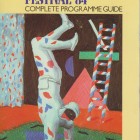Stabat Mater 1984Edinburgh International Festival
Read more about the opera Stabat Mater
This was a spectacular opening concert for the first Festival under the direction of Frank Dunlop. With Riccardo Muti leading a superb quartet of soloists and his wonderful Philharmonia up from London, the musical results were outstanding. The relative neglect of Rossini's Stabat Mater remains surprising, but it is a difficult work to bring off. Perhaps it is just that the dramatic quality of this music, composed long after his operas, seems out of character. Now that we are getting to know, if only on record, some of his serious operas, the links to Beethoven can be discerned. Perhaps that is why Muti decided to launch the Festival with Beethoven's Second Symphony before the interval.
These soloists, led by young Cecilia Gasdia, made an excellent international team. Ann Murray, having begun her career with Scottish Opera, was a familiar voice. Francisco Araiza had stood out as a young member of the Zurich company in 1982 and now launched on to his excellent solo career. James Morris enjoyed a long and prestigious career at the Met.
The 1984 Edinburgh Festival was the first under the guidance of theatre director Frank Dunlop. Many examples of his work had been seen at previous festivals, going back to the sixties. After the previous year's superbly adventurous Viennese programming, it remained to be seen how he would achieve the challenging balancing act faced by every director when the various elements of opera, dance, classical concerts and drama need to be offset.
The chunky programme book containing details of every event - an idea repeated from 1983, but not to be continued thereafter - reveals the difficulty in the operatic programme. The central event was scheduled to be a second visit by Welsh National Opera. The two operas were to be a recent successful UK premiere production of Greek Passion by Martinů, conducted by Charles Mackerras, and Parsifal to be led by tha great Wagnerian Sir Reginald Goodall. In the event, Goodall was too ill to attend, and was to be replaced by his assistant. The Festival bizarrely pulled the plug on the entire visit, at very short notice, leaving a gaping hole in the schedule, annoying those who had wanted to see both operas. The reaction of the various Welsh personnel can only be imagined.
What remained was rather thin. Scottish Opera followed its previous success with L'Egisto by importing a staging of Cavalli's L'Orione from Santa Fe. The Washington opera brought a double bill of early Menotti works, The Telephone and The Medium. In those impoverished circumstances, a concert performance of Bartók's Duke Bluebeard's Castle, with Dietrich Fischer-Dieskau and his wife Julia Varady assumed much greater importance. Fortunately there were several excellent choral works on show - the Rossini Stabat Mater, Vaughan Williams Sea Symphony, Delius Mass of Life, Prokofiev Alexander Nevsky and Mozart Coronation Mass.
